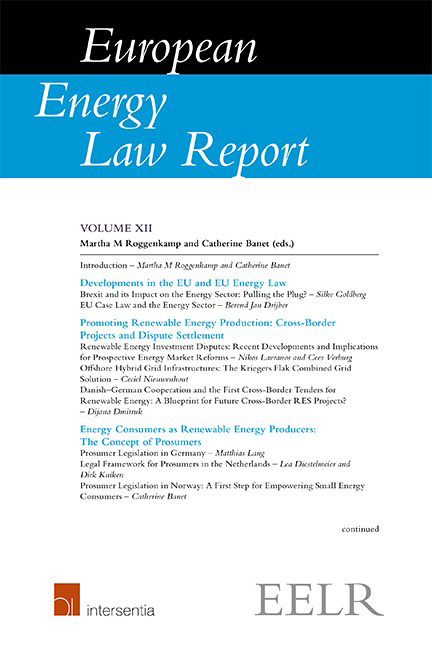Book contents
- Frontmatter
- Preface
- Contents
- List of Abbreviations
- List of Contributors
- Introduction
- PART I Developments In The EU and EU Energy Law
- PART II Promoting Renewable Energy Production: Cross-Border Projects And Dispute Settlement
- Chapter III Renewable Energy Investment Disputes: Recent Developments And Implications For Prospective Energy Market Reforms
- Chapter IV Off shore Hybrid Grid Infrastructures: The Kriegers Flak Combined Grid Solution
- Chapter V Danish-German Cooperation on the First Cross-Border Tenders for Renewable Energy: A Blueprint for Future Cross-Border RES Projects?
- PART III Energy Consumers As Renewable Energy Producers: The Concept Of Prosumers
- PART IV Balancing Renewable Electricity Production Withsupply Security: National Experiences With Capacity Mechanisms
- PART V Promoting The Use Of Sustainable Gas And Security Of Gas Supply
Chapter III - Renewable Energy Investment Disputes: Recent Developments And Implications For Prospective Energy Market Reforms
from PART II - Promoting Renewable Energy Production: Cross-Border Projects And Dispute Settlement
Published online by Cambridge University Press: 31 January 2019
- Frontmatter
- Preface
- Contents
- List of Abbreviations
- List of Contributors
- Introduction
- PART I Developments In The EU and EU Energy Law
- PART II Promoting Renewable Energy Production: Cross-Border Projects And Dispute Settlement
- Chapter III Renewable Energy Investment Disputes: Recent Developments And Implications For Prospective Energy Market Reforms
- Chapter IV Off shore Hybrid Grid Infrastructures: The Kriegers Flak Combined Grid Solution
- Chapter V Danish-German Cooperation on the First Cross-Border Tenders for Renewable Energy: A Blueprint for Future Cross-Border RES Projects?
- PART III Energy Consumers As Renewable Energy Producers: The Concept Of Prosumers
- PART IV Balancing Renewable Electricity Production Withsupply Security: National Experiences With Capacity Mechanisms
- PART V Promoting The Use Of Sustainable Gas And Security Of Gas Supply
Summary
INTRODUCTION
There has always been a strong relationship between investment disputes in the energy sector and international investment law, with the former often contributing to the development of the latter. Historically, most of the energyrelated investment cases concerned the mining sector or the conventional electricity sector. In recent times, an increasing number of cases concern disputes that have arisen in the renewable energy sector.
Over the last few decades States, including Member States of the European Union (EU), have increasingly acknowledged the importance of renewable energy sources (RES) for a variety of reasons, including climate change mitigation and the reduction of energy dependency. In order to increase RES energy production, EU Member States have adopted support schemes aimed at incentivising RES investments.
In some countries, these initiatives were so successful that the States were subsequently confronted with guaranteed payments to RES producers at such high levels that – in the eyes of those States – the support schemes became untenable when the financial crisis, starting in 2008 – 09, hit many EU Member States. Consequently, several EU Member States adopted measures which reduced payments or fundamentally altered remuneration parameters – sometimes even with retroactive effect.
Unavoidably, this has resulted in an unprecedented high number of investment disputes. Besides numerous court proceedings before domestic courts, international RES investment disputes have arisen under the Energy Charter Treaty (ECT), the North American Free Trade Agreement (NAFTA) and several bilateral investment treaties (BITs).
Moreover, since many investment disputes have been brought by European investors against EU Member States, the European Commission (EC) has regularly intervened as amicus curiae in support of the EU Member States claiming that arbitral tribunals lack jurisdiction since EU law supersedes the ECT and BITs. Accordingly, the EU – through the EC – is also involved as a nondisputing party in these disputes.
The increased levels of RES production are confronting the energy markets, especially the electricity market, with challenges – of a technical, organisational and legal nature. Therefore, the EC took the first steps in late 2016 to reform the energy markets within the EU in order to facilitate a transition to sustainable, well-functioning and liberalised energy markets.
- Type
- Chapter
- Information
- European Energy Law Report XII , pp. 65 - 94Publisher: IntersentiaPrint publication year: 2018

